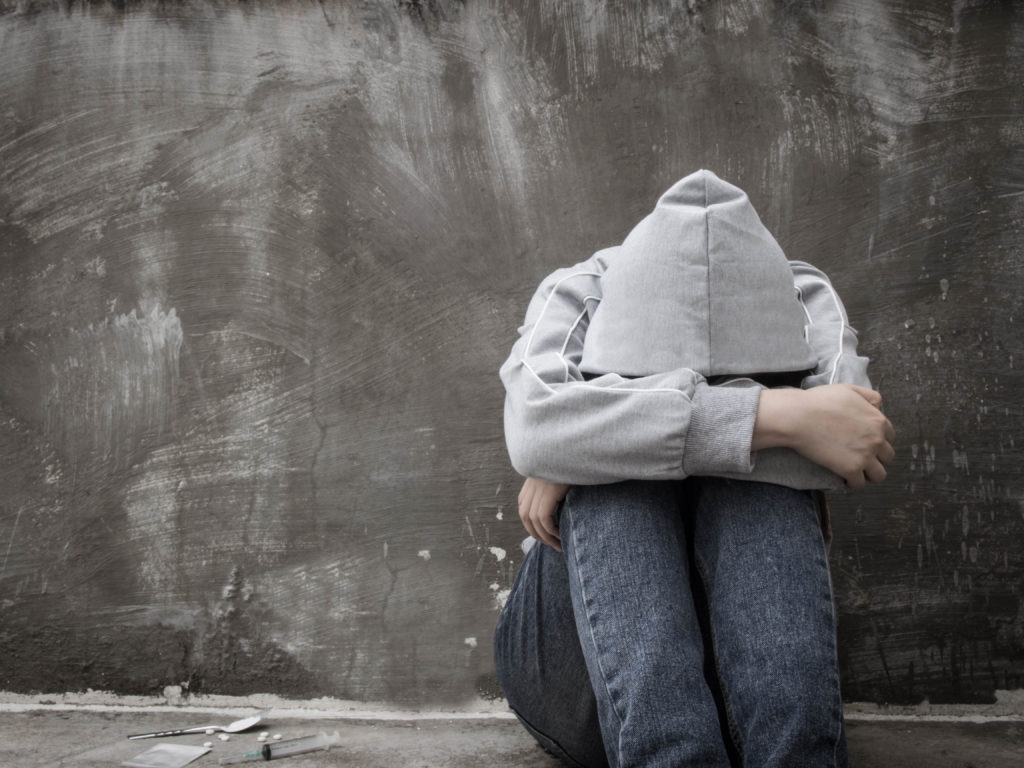SAFE HARBOR TREATMENT CENTER
Co-Occurring Disorders
Co-occurring disorders, formerly known as dual diagnoses, refers to the coexistence of mental health issues along with a substance abuse disorder. Individuals with mental health disorders are more likely than individuals without mental health disorders to struggle with alcohol or substance use disorders. It can happen when a person meets the diagnostic criteria of two mental health issues or a mental health issue and a substance use problem etc. In a number of cases, an underlying problem gives rise to another psychological issue which can in turn can result in two diagnoses. This is also described as co-morbidity or co-occurring mental health issues.
Each individual suffering from co-occurring conditions are different when it comes to their experience with addiction and mental illness. For most people, they began to experience mental health issues and tried alcohol or drugs soon after in order to “self-medicate”. For others, they first develop an addiction that grows so severe that it causes or triggers a mental health disorder. Clients with co-occurring orders often face more chronic medical, social and emotional trouble than clients suffering from addiction or mental health illness alone.


WHERE THERE IS LOVE, THERE IS HEALING. STAY IN THE LOVE.
A Path to Full Recovery
At our dual diagnosis treatment center in California, we use a variety of programs compassionately created to target and overcome co-occurring conditions. Our treatments are designed to relieve an array of mental and physical conditions that come along with co-occurring conditions. In addition to practices such as yoga, mindfulness, and meditation, we also use non-addictive medication programs to treat co-occurring disorders and put you on the path to full mental and physical recovery.
We invite you to reach out to a member of our team as soon as you are ready.
Our Admissions Department is kind and patient, as we understand the stress and fear you may be experiencing. You have made a courageous decision and we are here to support you 24 hours a day.
SAFE HARBOR TREATMENT CENTER
What is Dual Diagnoses and How Can it Help you Get Better?
Co-occurring disorders, formerly known as dual diagnoses, refers to the coexistence of mental health issues along with a substance abuse disorder. Individuals with mental health disorders are more likely than individuals without mental health disorders to struggle with alcohol or substance use disorders. It can happen when a person meets the diagnostic criteria of two mental health issues or a mental health issue and a substance use problem etc. In a number of cases, an underlying problem gives rise to another psychological issue which can in turn can result in two diagnoses. This is also described as co-morbidity or co-occurring mental health issues.
Each individual suffering from co-occurring conditions are different when it comes to their experience with addiction and mental illness. For most people, they began to experience mental health issues and tried alcohol or drugs soon after in order to “self-medicate”. For others, they first develop an addiction that grows so severe that it causes or triggers a mental health disorder. Clients with co-occurring orders often face more chronic medical, social and emotional trouble than clients suffering from addiction or mental health illness alone.

How Does Dual Diagnoses Help in Treatment?
Dual diagnosis can help in the treatment of related problems in a much better way by addressing all diagnosis’s rather than one at a time. If a clinician works for the progress of only one symptom then it might not work well as the other diagnosis will looming around causing issues until addressed. Having co-occurring diagnoses can help the psychiatrist cater to all issues at once. It also helps the clinical psychologist or psychologist create a management plan well suited for long-term recovery.
CO-OCCURRING DISORDERS
Most Common Dual Diagnoses in the U.S.
The most common diagnoses in this category lay around the corners of drug abuse, drug addiction with a co-occurrence of mental health issues. The most common dual diagnosis’s given by clinicians in the United States include:
- Substance Use Disorder or Addiction with Depression
- PTSD with Substance Use Disorder (mostly Alcohol or Heroine Use)
- Substance Use Disorder with Drug Induced Psychosis
- ADHD with Autism
- Intellectual Deficit with Symptoms of Autism
As we can see that in the above most commonly occurring problems, drug addiction is certainly one of the common problems that occur between the two diagnoses. In the US, drug addiction has become a serious problem and has given rise to a number of mental health issues. Recent stats show the rise of dual diagnoses in the US population in recent years.
Who is at Risk for a Dual Diagnoses?
• War Veterans
• Juvenile delinquents
• People with a history of psychological issues
• People with a history of drug use and abuse
• Family members of people with a psychological disorder
• Family members of people with a drug related problem
• Poverty/having a low socioeconomic status
• Men are more likely to have a dual diagnosis compared to women
CO-OCCURRING DISORDERS
Dual Diagnosis Facts
There are a number of things that are not known by the masses due to lack of awareness. Here are a few facts about Dual Diagnoses that can help you or your loved ones who are under going through these issues.
A person might not always get diagnoses of two problems when they are having a psychological or substance use issue.
A substance use issue may not necessarily bring about another disorder however, it is common for drug or alcohol use occur alongside another medical diagnosis.
Many drugs alter the chemistry of the brain in such a way that the user can have severe symptoms of a psychological problems. This makes it challenging for clinicians to determine if the substance use led to medical issues, or vice versa.
There are number of psychological issues such as depression, poor coping mechanisms, low self-esteem, relationship issues, and PTSD that are frequently linked to drug abuse. This can result in a dual diagnoses.
At times, people self-medicate themselves when they face a mood disorder. The misuse of prescription drugs can bring about the issue of drug dependence as the side effect of most mood stabilizers is addiction. This is the reason it advised to seek proper mental health supports for medication purposes and to monitor them too.
Dual diagnoses is not restricted to mental health issues associated with drug problems. They can occur in a number of other cases too. For example, a person can have a diagnoses of depression and PTSD. Or a person can have a dual diagnoses of ADHD and Anxiety. A clinical evaluation can help identify the correct diagnoses.
Dual Diagnosis Misconceptions
Society has several misconceptions about dual diagnosis and co-occurring disorders. Here are a few misconceptions which are actually not true to any extent and you must not believe them if you hear them.
DUAL DIAGNOSES ARE NOT POSSIBLE
Well, it is totally possible to have dual diagnoses. When you are having more than one psychological disorder or a psychological disorder with co-occurring drug related problem, it’s a dual diagnosis.
DUAL DIAGNOSES ARE ONLY GIVEN SO DOCTORS CAN MAKE MONEY BY TELLING PEOPLE TO GO TO BOTH TREATMENTS.
Again, it is not true at all. Even a person has a single diagnoses of a mental health disorder or drug dependence, they need both psychological and psychiatric help to fully recover from the conditions.
DUAL DIAGNOSIS MEDICATIONS CAN MAKE YOU SLOW AND ADDICTED
It is not true, medication is always monitored by the psychiatrist and they manage the dosage according to the person they are giving treatment. When a patient does not talk to their psychiatrist or doctor before making medication choices, the likelihood of addiction increases. Self-medication can result in addiction. Regular follow ups with your psychiatrist and being open and honest about how the medication is making you feel will help you more.
PSYCHIATRIC MEDICATIONS ARE FOR A LIFETIME
This is a very wrong and common misconception about psychiatric medication. Most studies reveal that the average duration of medication for patients with psychological issues only goes from 2-5 years. While only 7% of people require lifelong medication, which mostly occurs in more severe cases.
YOU DON’T NEED MEDICATION TO GET BETTER
This may be true in a number of cases, but if your clinician is referring you to a psychiatrist for medications, then it might be helpful for you to see them too.
Treating Dual Diagnoses
There are a number of options to consider when we talk about the treatment of Dual Diagnoses.
PSYCHOTHERAPY
Psychotherapy is an extremely important and essential part of treatment for any kind of dual diagnoses. Be it depression, anxiety, drug addiction or any other issues, Psychological therapy is very helpful in addressing complex health problems. There are a number of options to choose from when a person chooses psychological therapy for their problems. In addition to the therapies below, some other fruitful options for the treatment of dual diagnoses include Rational Emotive Behavior therapy (REBT), Behavior Therapy (BT), and Motivational therapy.
CBT
Cognitive Behavior Therapy (CBT), is one of the most widely used therapies all over the world with the highest success rate. It helps by working with the belief system of the patient. In this therapy, the patient works on their inner beliefs and they work towards building healthy beliefs systems.
DBT
Another very famous therapy is Dialectic Behavior Therapy (DBT) which is specialized for personality issues and drug related problems. It works on mindfulness and changing of problematic thoughts. This helps to direct people towards positive thinking thus changing the whole idea of living of one’s life.
ACT
A relatively new and famous psychological therapy for addiction or dual diagnoses is named Acceptance Commitment Therapy (ACT). ACT works on building a mechanism of accepting one’s life problems and then moving on with a changing pattern to bring about a better life style.
MEDICATION
Medication plays a vital role when it comes to dual diagnoses. Many substance abuse withdrawal symptoms are managed by medical professionals via medications. Along with that, mood related symptoms are frequently managed by medication if they vary from moderate to severe level. In cases where a person gets into a drug induced psychosis or schizophrenia, medications become essential for treatment. In case of psychosis, a person’s reality gets distorted due to delusional beliefs or hallucinations. This happens as a result of faulty brain chemistry that tends to occur after continuous drug usage. Thus, taking medication become necessary to get rid of psychosis symptoms.
GROUP THERAPY
Group Therapy plays a vital role in helping to address symptoms. Research has stated that people who go to group therapies for their psychological issues tend to get better by 20% as compared to people who only take medication. Another research study supported the fact that the symptoms of patients subsided by 70% when they took psychological therapy, medication and group therapy for their psychological issues. Group therapy gives a sense of belongingness and not being alone. This helps people get better in a fast pace as a group.
FOLLOW UP AND AFTERCARE
When the therapy and medications are ended, it is still necessary that a patient keeps the techniques learned close to heart. Follow up sessions by a therapists should be completed as needed so that any trigger or change in lifestyle does not result in a negative role or relapse of symptoms. Ideally, any major life change will be discussed and planned for before it occurs. For example, moving can be a stressful event and should be discussed with your healthcare professional to create a relapse prevention plan if it could lead to relapse.
SAFE HARBOR TREATMENT CENTER
Finding Help With Dual Diagnoses
Although the path to receiving a dual diagnosis is often challenging, full recovery from co-occurring conditions is possible with proper supports. If you, or someone you love is struggling with a substance use issue and mental health issues or multiple issues that require assistance, Safe Harbor Treatment Center can help you get the help you are seeking.

